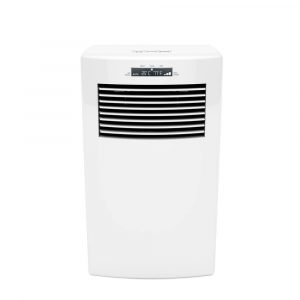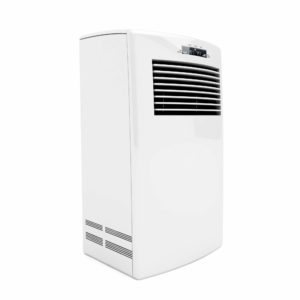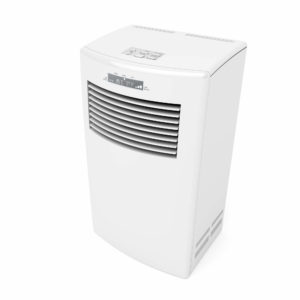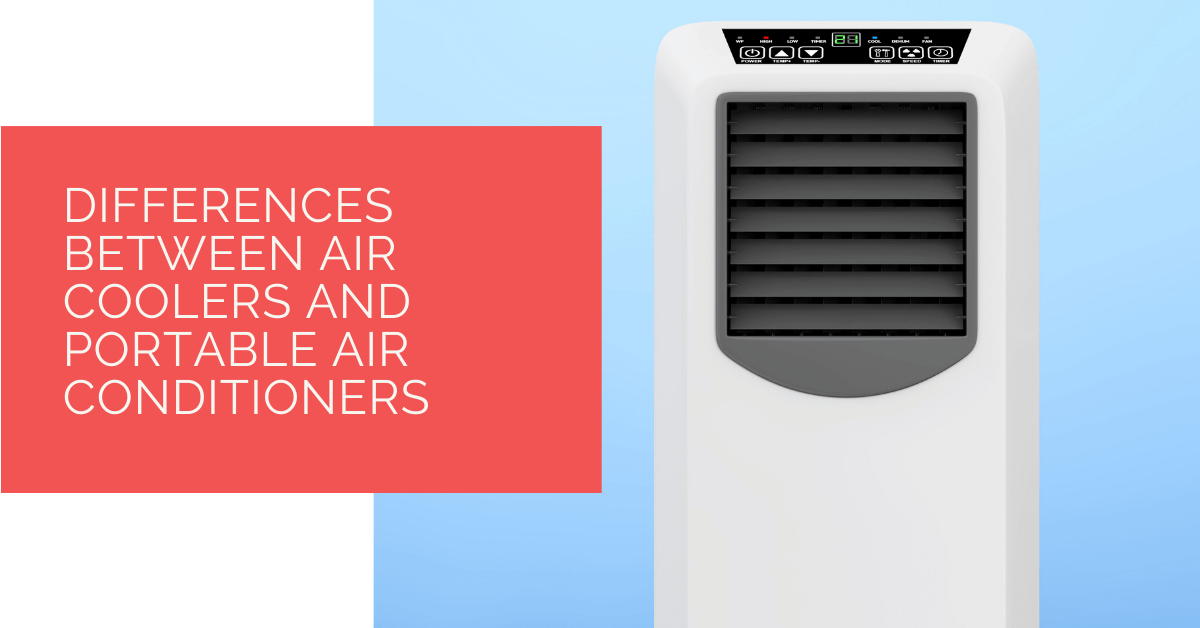Air coolers and portable air conditioners are the UK’s two most commonly used appliances to escape the terrible summers. However, before investing in these appliances, knowing the difference between them is essential.
Thorough research is important for purchasing the perfect air cooler or air conditioner that meets all your house requirements. To help you with this, we list the primary differences between the two devices.
Contents
- 1 Key Takeaways
- 2 What Is an Air Cooler?
- 3 How Air Coolers Work
- 4 What Is a Portable Air Conditioner?
- 5 How Portable Air Conditioners Work
- 6 Main Differences Between an Air Cooler and A Portable Air Conditioner
- 7 When to Use a Portable Air Conditioner
- 8 When to Use an Air Cooler
- 9 Comparison: Air Coolers vs. Portable Air Conditioners
- 10 How to Choose a Portable Air Conditioner or Air Cooler?
- 11 Heat Pump Source: Reliable Heating and Cooling Solutions
- 12 Conclusion
Key Takeaways
- Air coolers are simpler, more cost-effective, and suitable for dry climates, while portable air conditioners are heavier-duty, more efficient, and ideal for humid climates.
- Air coolers are more budget-friendly, but their performance depends on water tank size, and they don’t work well in larger rooms. Portable air conditioners offer better cooling and humidity control.
- Air coolers are easier to install and maintain, while portable air conditioners may require more complex installation and regular servicing.
What Is an Air Cooler?
It is easy to confuse air conditioners with air coolers.
An air cooler is a much simpler functioning appliance than an air conditioner. It is not equipped with complex components or gas. This makes them more cost-effective and a good fit for dry climates. They are also much smaller in size and hence more preferred as they can fit inside your living room easily.
However, despite their compact size, they have an excellent cooling capacity; they give out much cooler air than air conditioners.
So, if you want to beat the summer heat, these compact devices that come in various models like window coolers, desert coolers, or personal coolers are the perfect solution!

How Air Coolers Work
Air coolers, also known as evaporative coolers, function on the simple principle of evaporation. They consist of a fan, water-soaked pads, and a pump. The fan draws warm air from the environment, passing through the wet pads. As the air passes through these pads, water evaporates, absorbing and cooling heat from the air. This cooled air is then circulated back into the room. Air coolers are most effective in dry climates, where adding moisture can be a welcome relief.
Key Components of Air Coolers:
- Fan: Circulates air through the cooler and into the room.
- Water Pads: Made of absorbent materials, these pads facilitate evaporation.
- Pump: Circulates water from the reservoir to keep the pads wet.
- Water Reservoir: Holds the water used for the evaporation process.
What Is a Portable Air Conditioner?
Portable air conditioners are divided into two units:
- Monoblock systems: These air conditioners house all parts within a single unit and are one of the least expensive. They are ideal for use alongside an alternate cooling unit.
- Portable split-air Conditioners: They have two units- an outdoor unit containing the compressor and condenser, while the indoor unit includes the ventilation system.
Portable split-air conditioners are more expensive but quieter than monoblock systems. They also have a much stronger cooling system and cool the room more efficiently than an air cooler. Lastly, they are perfect for humid climates.

How Portable Air Conditioners Work
Portable air conditioners work on a different principle, using a refrigeration cycle similar to a standard window air conditioner. They have a compressor, a refrigerant, an evaporator, and a condenser. Warm air from the room is drawn into the unit, passing over the evaporator coils. These coils contain a refrigerant that absorbs heat from the air, cooling it down. The warm refrigerant is then pumped to the condenser, releasing the heat outside through an exhaust hose.
Key Components of Portable Air Conditioners
- Compressor: Increases the pressure and temperature of the refrigerant.
- Refrigerant: A chemical compound that transitions from liquid to gas, absorbing and releasing heat.
- Evaporator Coils: Where the refrigerant absorbs heat from the indoor air.
- Condenser Coils: Where the heated refrigerant releases its heat to the outside.
- Exhaust Hose: Expels the warm air outside the room or building.
Main Differences Between an Air Cooler and A Portable Air Conditioner
Costing
An air cooler will always be a cheaper option than portable air conditioning units since the electricity consumption of an air cooler is substantially low it doesn’t release any harmful gases, making it more sustainable and eco-friendly.
But if you don’t have any budget constraints, you can consider going for an air conditioner.
Performance
- Air coolers: Unlike an air conditioner, an air cooler does not give you a remote-control option to operate the evaporative cooler. Additionally, the efficiency of air coolers depends on the size of the water tank, and they don’t effectively work in larger rooms or spaces. So, you need to purchase a water tank according to the size of your room for an efficient cooling effect.
- Portable air conditioners: Portable air conditioners have more efficient functioning as they are heavy-duty machines. This also means the cooling effect is a few degrees higher than air coolers.
If you live in a humid climate, an air conditioner is a perfect option as it will effectively cool down the humidity level.
Maintenance
- Air coolers: Air coolers must be filled with water or ice every day or whenever you wish to use them. Additionally, you must ensure that the water doesn’t become a breeding spot for mosquitos and pests.
- Portable air conditioner: These units must be serviced frequently to ensure efficient functioning. The exhaust hose can sometimes collect contaminated water from the unit. Ensure that you clean it promptly.
Installation
- Air coolers: An evaporative cooler doesn’t require professional assistance while installing it. It has a very simple procedure for installation. You must fill the water tank with cold water and plug it in. You can also explore the fan mode in evaporative coolers and set it per your requirements.
- Portable air conditioner: It is relatively easier to install monoblock portable air conditioners as you need to pass the hose through an air vent. When installing a split air portable air conditioner, you must find a spot outdoors for the second unit. This can prove to be slightly tricky.
When to Use a Portable Air Conditioner
Ideal for High Humidity and Larger Temperature Reductions
Portable air conditioners are the go-to choice in environments with high humidity levels. Unlike air coolers, they don’t add moisture to the air, making them suitable for humid climates. If you need to reduce the room temperature significantly, more than just a few degrees, a portable air conditioner is your best bet.
Effective in Sealed Spaces
These units work efficiently in closed spaces where windows and doors can be shut. This is because they extract warm air from the room, cool it, and then recirculate the chilled air back into the room, effectively reducing both temperature and humidity.
Versatility and Multi-Functionality
Portable air conditioners often come with additional features like dehumidifiers and air purifiers. They are a great choice if you’re looking for a multi-functional device that not only cools the air but also improves its quality.
When Consistent Cooling is Needed
Portable air conditioners are more effective for continuous and consistent cooling, especially in areas like office spaces or larger living rooms. They maintain a steady temperature, which is particularly beneficial during prolonged periods of heat.
When to Use an Air Cooler
Best for Dry Climates
Air coolers are most effective in dry climates. They work on the principle of evaporative cooling, adding moisture to the air, which can be a relief in arid conditions. If you live in an area with low humidity, an air cooler can help make the air more comfortable.
Energy Efficiency
If energy consumption is a concern, air coolers are a more economical choice. They consume significantly less electricity than portable air conditioners, making them a cost-effective cooling solution.
For Smaller Temperature Adjustments
Air coolers are ideal when you need to lower the room temperature by a few degrees. They are perfect for personal use or in smaller spaces where a slight decrease in temperature can make a big difference.
Ventilation Requirements
Unlike portable air conditioners, air coolers require a constant fresh air flow. They are most effective in rooms with good ventilation or where a window can be kept open. This makes them suitable for spaces where fresh air circulation is preferred or needed.
Adding Humidity to the Air
In environments where the air is too dry, air coolers can help increase humidity levels, making them beneficial for both comfort and health, especially for those who suffer from dry skin or respiratory issues.
Comparison: Air Coolers vs. Portable Air Conditioners
Choosing between an air cooler and a portable air conditioner can be crucial when it comes to cooling your space. Each has unique features, benefits, and ideal use cases, making them suitable for different environments and needs. To help you navigate this decision, we’ve compiled a detailed comparison table. This table breaks down the key aspects of air coolers and portable air conditioners, from their operational principles and climate suitability to energy efficiency, cost, and maintenance requirements. Whether you’re looking to beat the heat in a dry or humid climate, seeking energy efficiency, or need to understand the cost implications, this table provides a clear and concise overview to guide your choice. Let’s dive into the specifics to find the perfect cooling solution for your needs.
| Feature | Air Cooler | Portable Air Conditioner |
|---|---|---|
| Principle of Operation | Evaporative cooling: Air passes through water-soaked pads, causing evaporation and cooling. | Refrigeration cycle: Uses a compressor and refrigerant to cool air, expelling heat through an exhaust hose. |
| Climate Suitability | Best in dry, low-humidity environments. Adds moisture to the air. | Ideal for humid climates. Reduces humidity and cools the air. |
| Energy Efficiency | High efficiency, lower power consumption. | Lower efficiency, higher power consumption. |
| Installation | Simple, no need for exhaust. | Requires setup for exhaust hose and window sealing. |
| Maintenance | Regular cleaning of water pads and reservoir. | Filter cleaning and refrigerant checks. |
| Cost | Generally lower initial and operational costs. | Higher initial purchase and operational costs. |
| Cooling Capacity | Suitable for smaller areas and personal cooling. | More effective for larger spaces and significant temperature reduction. |
| Noise Level | Generally quieter operation. | Can be noisier due to the compressor. |
| Portability | Highly portable, no need for venting. | Portable but requires venting to the outside. |
| Added Humidity | Increases room humidity, beneficial in dry climates. | Does not increase humidity, suitable for moist climates. |
| Environmental Impact | Uses water for cooling, eco-friendly. | Uses refrigerants, potential environmental impact. |
How to Choose a Portable Air Conditioner or Air Cooler?
Purchasing any kind of appliance or machine, however compact or large, requires thorough research. The same applies to a portable air conditioner or air cooler.
Based on your climatic conditions and room space, you can compare which serves the purpose more effectively.
Additionally, here are a few other points that you can consider before making your choice:
Pricing
If you’re looking to buy a cooling device for a smaller space, you can cut your expenses by going for an air cooler, as it’s cheaper than a portable air conditioner.
However, an air cooler won’t be the best option if you have a larger space. You can research well and compare various models to pick the best one.

Functioning
Evaporative coolers and air conditioners work very differently. The functionality of these appliances is also different. You can efficiently operate a portable air conditioner with a remote control and set the temperature according to your needs. This feature is not offered in an air cooler as it must be operated manually.
Air Treatment
Some air coolers have a humidifying feature, mainly used in a dry climate and releasing essential moisture into the dry air.
On the other hand, air conditioners surely come with a dehumidifying feature. You can also find portable air conditioners with additional air or charcoal filters that effectively release fresh air into the room.
Lastly, you can also select portable air conditioners with various fan modes to use as a regular fan and not cool down the temperature.
Cooling Power
When purchasing a portable air conditioner or an air cooler, remember that the device’s power rating must match your room’s size and cooling requirements.
Portable air conditioners require around 80 watts per square meter. Air coolers have flexibly designed models according to the size of the room, and you can find them in the manufacturer’s guide.
Heat Pump Source: Reliable Heating and Cooling Solutions
At Heat Pump Source, we take pride in our unwavering commitment to serving the UK with top-tier HVAC solutions. From the efficiency of heat pumps and the cool relief of air conditioning to the warmth of boilers, radiators, and underfloor heating, our dedicated team is always at the forefront of innovation. We understand the unique needs of every household and business, and we strive to provide dependable health and cooling products and services that are tailored just for you. Ensuring your comfort and satisfaction is our utmost priority. Whether you have questions, need guidance, or require support, we’re always here to assist. Please don’t hesitate to contact us; we’re eager to be of service.
Conclusion
Regardless of the appliance you choose, both machines are an excellent investment to control increasing heat levels effectively.
Also, remember regular care of a machine is essential for making it last longer and function more efficiently. So, make sure to keep the machines clean. You can replace the air filters if they have absorbed excessive dirt or dust.
About the Author
At Heat Pump Source, our articles are the product of a collaborative effort among highly skilled HVAC experts. Our dedicated professionals, hailing from diverse backgrounds in heating, ventilation, air conditioning, and refrigeration, contribute their extensive knowledge and experience to every piece of content. This multidisciplinary approach ensures comprehensive coverage. Our commitment is to deliver authoritative, reliable, and tailored advice to meet the unique needs of every household and business across the UK.

